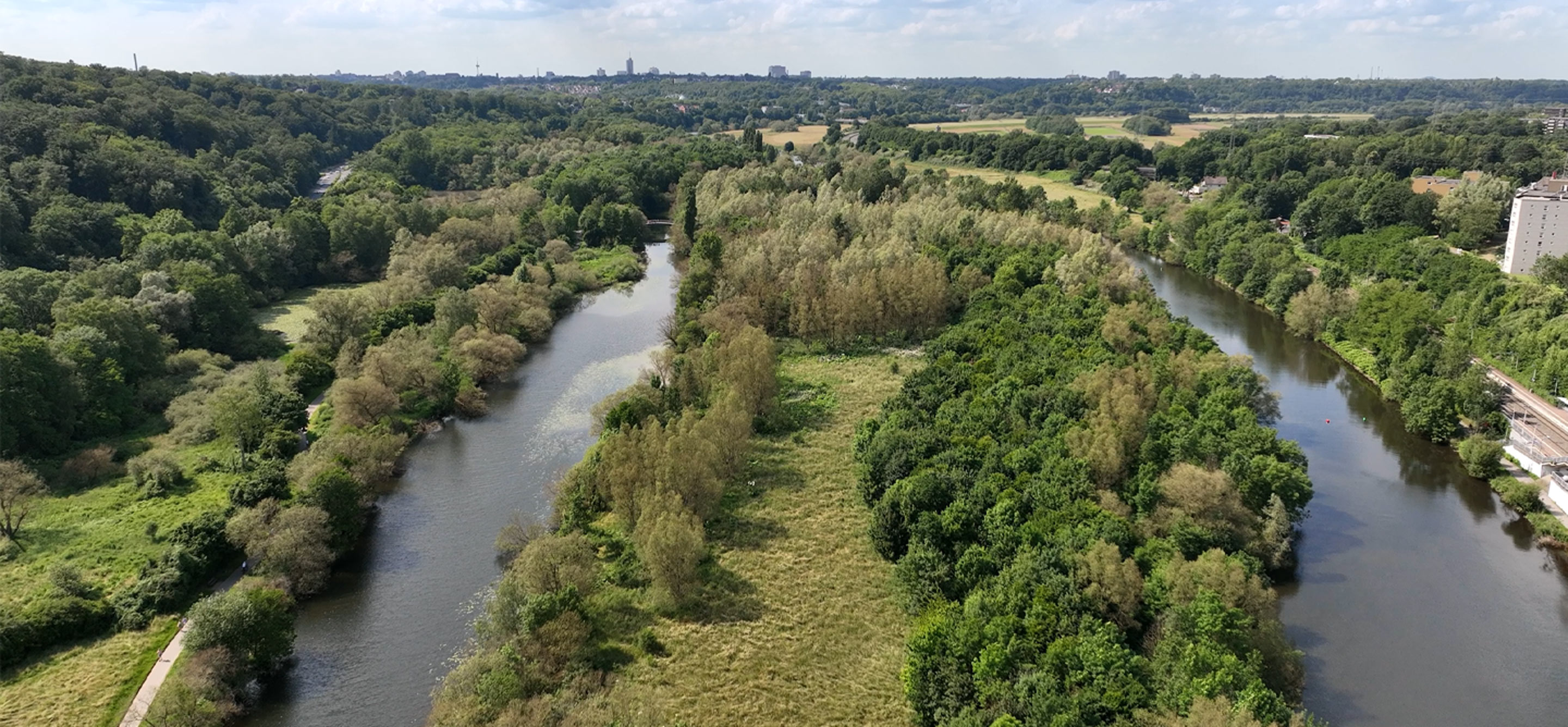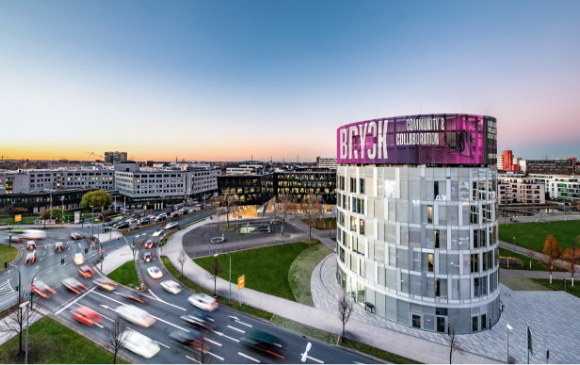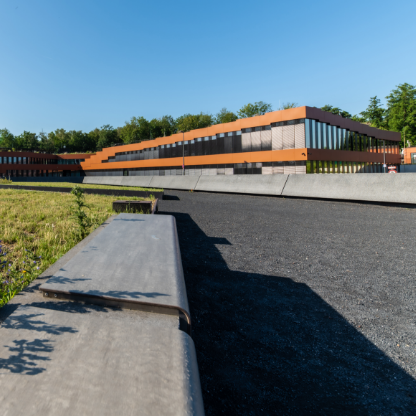
Responsibility
Sustainability – part and parcel of the foundation’s purpose
For the RAG‐Stiftung as a private-law foundation, responsible corporate governance which strikes a balance between economic, ecological and social sustainability requirements is a must if it is to fulfil its original mission. Financing perpetual obligations from German hard coal mining obligates it to heed long-term decision-making time horizons that embrace the well-being of present and future generations alike.
In addition to the ecological value that the RAG-Stiftung contributes, particularly in the areas of pit water management, polder measures and ground water purification, it also creates social value through its support activities. As a result, it imparts major impetus to enabling a sustainable transformation around the former mine sites.
The RAG‐Stiftung’s work is predicated on the 17 Sustainable Development Goals (SDGs) of the United Nations, which also guide the foundation in developing its activities further.

©snowing/freepik
Integration of sustainability in core processes
To further develop its own processes and workflows, the RAG-Stiftung maintains a structured dialogue with other foundations, strategic financial partners and management of the companies in which it holds equity investments. The RAG-Stiftung also leverages the growing knowledge of the levers of control, interdependencies and best practices relating to sustainability in the field of investment management and in its capital investment strategy, including relevant opportunity and risk assessments. The starting point for that is always whether an investment makes economic sense, namely whether it generates the returns needed for the foundation to fulfil its purpose.
The RAG‐Stiftung always treats environmental and social risks as potential financial risks that have to be identified, monitored and evaluated on an ongoing basis. ESG criteria are integrated into the traditional financial analysis. That also includes an evaluation of potential cost or reputational risks, such as those that may result from delayed approval procedures in connection with addressing perpetual obligations.
Responsibility as a good owner and investor
As a good owner, the RAG‐Stiftung actively uses its possibility to exert influence as part of existing strategic holdings. Depending on its stake, these include the assumption of seats on Supervisory Boards, dialogue with management and the exercise of voting rights at Annual General Meetings.
Sustainability is an important growth driver for many of the companies in which the RAG Stiftung has invested. Overall, investment management is geared towards tapping potential from relevant megatrends worldwide, in conjunction with creating prosperity, skilled jobs and public revenues for the region.
As a responsible investor, the RAG‐Stiftung is guided by the Principles for Responsible Investment (PRI) of the UN Environment Programme and UN Global Compact. That specifically means the RAG‐Stiftung
- includes ESG issues in its analysis and decision-making processes,
- takes ESG aspects into account in its investment policy and in practice as an active shareholder,
- urges companies and corporations it invests in to ensure appropriate ESG reporting, and supports and promotes acceptance and implementation of the principles of responsible investing,
- cooperates with other responsible investors, and
- reports in this way about activities and progress.
In relation to its capital investments, the RAG‐Stiftung regularly requests relevant fund managers to provide information on their ESG activities and takes exclusion criteria into account when selecting assets. Where deviations from the underlying investment policy become visible, the foundation’s maxim is “engagement before divestment.” It aims to give preference to investments that pursue social or ecological objectives in addition to a reasonable return. The RAG‐Stiftung’s own disclosure and reporting practices go beyond the legally required level.

©Pexels/alphatradezone

©Mike Henning
As part of its finance and investment strategy, the RAG-Stiftung also has a vital interest in obtaining access to successful start-ups and forward-thinking innovations. The aim is to identify and develop potential investments at as early a stage as possible. The focus is on the Ruhr region, a metropolitan area with numerous companies and a unique university landscape which offers special opportunities and synergies for start-ups. To further invigorate the relevant ecosystem, the RAG-Stiftung launched the BRYCK innovation hub and future factory in 2022, in which it currently holds an 80 percent stake. Located in the heart of Essen’s city centre, BRYCK leverages the close networking of companies, science, research and teaching to help young entrepreneurs take their first steps in turning a promising idea into a marketable innovation. It focuses on three clusters: medicine and health, chemicals and materials management, and logistics and the hydrogen economy. The cross-cutting topics of digitization and sustainability run through all of the start-up activities supported by BRYCK.
Supporting the future in post-mining regions
Sustainable transformation and social change are particularly important in the former mining regions along the Ruhr and Saar rivers and in Ibbenbüren. The RAG-Stiftung helps to shape this process of change and boost their innovative force and sustainability. Much of that radiates an impact far beyond the region and serves as a model for Germany as an industrial location.
In its responsibility for the consequences of post-mining, the RAG‐Stiftung contributes to leaving an intact and liveable environment behind for future generations. Top priority among the perpetual obligations is to protect drinking water as part of pit water management, polder measures and ground water purification. Support activities and the RAG‐Stiftung’s own lighthouse projects in education, science and culture that arise from them flank the development of and change in the post-mining regions. In this way, the RAG‐Stiftung builds a bridge between valuable mining traditions and essential future requirements. A particular emphasis is on equality of opportunities, participation and access to education. In all its engagement in the field of education (with the exception of school projects or projects for a specific year’s intake), the RAG-Stiftung aims to promote the advancement of women by setting quotas of between 30 and 50 per cent.
With its support for science and research in the field of post-mining, the RAG-Stiftung makes a valuable contribution to further enhancing knowledge about environmental protection and water management at the cutting edge of research. Research results on topics such as sustainable water management, emissions control, circular value creation or environmental monitoring are shared with other institutions and transferred to diverse national and international applications.

©GettyImages

©Mike Henning
Acting responsibly on both the large and small scale
The RAG‐Stiftung also takes its ecological and social responsibility seriously in its own workflows and processes and promotes continuous improvements on both a large and small scale. Since 2017, the RAG‐Stiftung has been headquartered at the Zollverein UNESCO World Heritage Site. The new building was awarded the highest level of certification, namely platinum, by the Deutsche Gesellschaft für Nachhaltiges Bauen (German Sustainable Building Council/DGNB). In addition to health and energy aspects, all materials used were also selected with regard to their recyclability.
Overall, the RAG‐Stiftung has set itself the goal of critically questioning the necessity of printing and mailing publications on a case-by-case basis. That led to a decision being taken at the end of 2022 to provide the Annual Report exclusively in digital form in the future, too. The RAG‐Stiftung works with local printers who offer climate-neutral production of its printed materials. From business stationery and materials to publications, paper from responsible sources is used (FSC certification/EU Ecolabel/Nordic Swan Ecolabel). Wherever possible, give-aways are produced in Germany and the EU and are purchased taking ESG criteria into account.
